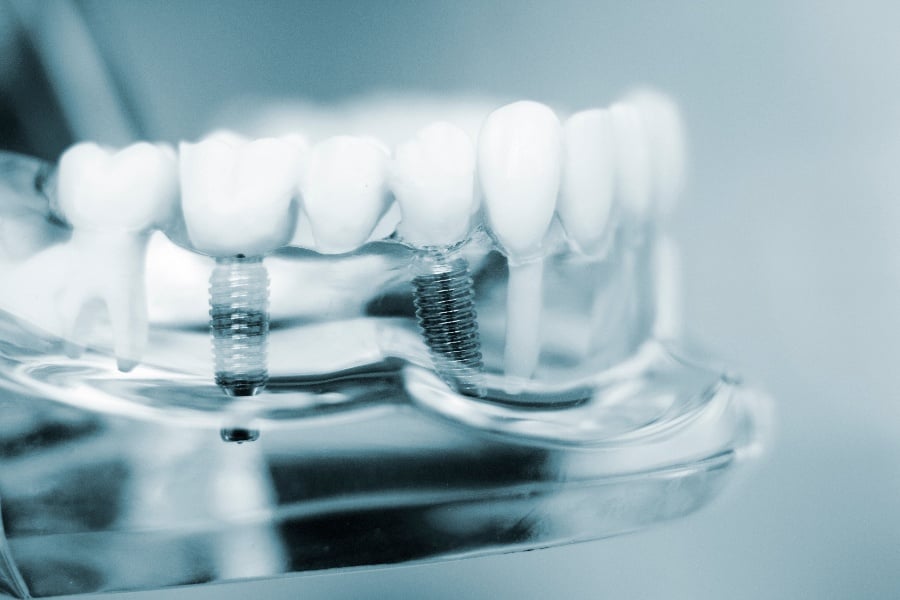Modern dentistry has benefited significantly from advancements in dental materials and techniques. Long-lasting local anesthetics, biocompatible metals such as titanium, and 3D imaging have brought remarkable success and patient satisfaction to dental implants.
The surgical placement of implants can now be performed with predictable comfort and outcomes. One of the common questions patients ask is, “how long does it take an implant to heal?”
When Are Dental Implants Used?
It is very common to have missing permanent teeth due to one or more of the following:
- Tooth decay.
- Advanced periodontal disease.
- Trauma.
- Heredity.
An implant is a dental prosthesis that replaces a missing tooth’s root. After surgical placement, implants support one of the following treatments that replace missing teeth:
- Single crown. In most cases, implants are the ideal treatment to replace a single missing tooth. A single-tooth implant has many advantages, including preserving the natural tooth structure of adjacent teeth.
- Fixed dental bridge. If you are missing several adjacent teeth, you might have the option of a fixed bridge instead of a removable partial denture. Implants are placed on both sides of the toothless space. These are used to support a bridge that will be permanently attached by using dental bonding materials.
- Dentures. Dental implants can be part of the treatment plan to restore many or all of your missing natural teeth. With strategic implant placement, four implants can support a complete set of upper or lower teeth, a procedure known as All-on-Four.
When Dental Implants Might Not Be Recommended
There are only a few instances where dental implants cannot be used. However, after a thorough medical and oral health evaluation, your dentist may caution you that your risk of implant failure is higher. The conditions that may affect the long-term success of implants include the following:
- Taking oral bisphosphonates medications for osteoporosis.
- Radiation treatment to the head and neck.
- Consuming tobacco products.
- Non-controlled diabetes.
- Daily alcohol consumption.
- Recent cardiovascular incident.
Can You Get an Implant Years After Tooth Extraction?
Dentists prefer to place implants as soon as possible after tooth extraction. One of the benefits of dental implants is their stimulation of bone to prevent bone loss after losing a tooth. Unfortunately, as more time passes after losing a tooth, the bone deteriorates from losing the stimulation provided by your tooth roots.
“The sooner, the better” is recommended when replacing a missing tooth with implants. However, you can still replace one or more missing teeth with implants years after losing them. If you have lost too much bone to support an implant, a bone graft will likely be recommended before implant surgery.
Patient Satisfaction with Dental Implants
Though the history of dental implants dates back to ancient Egypt, it was in the 1950s when major developments occurred. Then, a Swedish orthopedic surgeon began studying bone healing around surgically implanted titanium. As more has been learned about this healing process, known as osseointegration, implant surgery has improved. It can now be accomplished with about a 95% success rate. Today approximately half a million implants are placed each year in the United States.
A small number of implants fail to fuse with the bone and need removal. Additionally, other complications can occur. However, one survey found remarkable patient satisfaction with dental implants that had been placed for eight to fourteen years. The survey recorded that most patients would recommend the procedure to their friends and that there was a high degree of satisfaction with the following:
- Chewing efficiency and comfort.
- The appearance of the final restoration.
- Improvement in quality of life.
Is Dental Implant Surgery Painful?
The thought of surgery causes some people to pause when considering replacing missing teeth. If you spend much time searching the internet, you will see pictures of gums cut and holes drilled in the bone. Understanding what happens during dental implant surgery can alleviate your concerns and help you make a more informed decision.
Your dentist will get your gums and jawbone completely numb before beginning the surgery, which is essential to your being relaxed for the procedure. The local anesthetics used in dentistry today provide profound and long-lasting anesthesia for the duration of the procedure.
In addition to local anesthetic, your dentist will likely discuss the option of sedation dentistry. There are several available options, including:
- Nitrous (inhaled) sedation. You breathe a combination of oxygen and nitrous oxide through a mask during the procedure to help you relax. Nitrous oxide has been shown to be exceptionally safe and effective in providing minimal to moderate sedation for apprehensive dental patients.
- Oral sedation. Your dentist will discuss the specific medication and its dosage to provide mild to moderate sedation. Taking a Halcion pill shortly before surgery can provide several hours of relaxation for the procedure.
- IV sedation. Medications given through a vein can provide a deeper and profound sedation. Several different drugs are used in dentistry with a proven history of safety.
How Long Do Dental Implants Take to Heal?
The total healing time for dental implants depends on several factors, such as whether you need a bone graft procedure, the number of implants placed, your overall general health, and tobacco use. The opening made in your gums during surgery heals completely within a couple of weeks. Most patients’ gums heal significantly within the first week. You should expect some soreness and light bleeding initially, but this diminishes after a few days.
If you notice pain after the first week, you may have a gum infection known as peri-implantitis. Other signs of this infection include swelling, redness, bleeding, and a bad taste in your mouth. Seeing your dentist as soon as possible will help resolve the problem quickly.
After the incision in the gums, space is made in the underlying bone to receive the implant. It takes several months for the bone to fuse or osseointegrate with the implant. Factors such as the type of implant placed and the amount of healthy bone can determine the success of osseointegration.
Schedule an Appointment
Dental implants can change your smile and improve your life in many ways. To learn more about our implant process, call us or contact us online.




